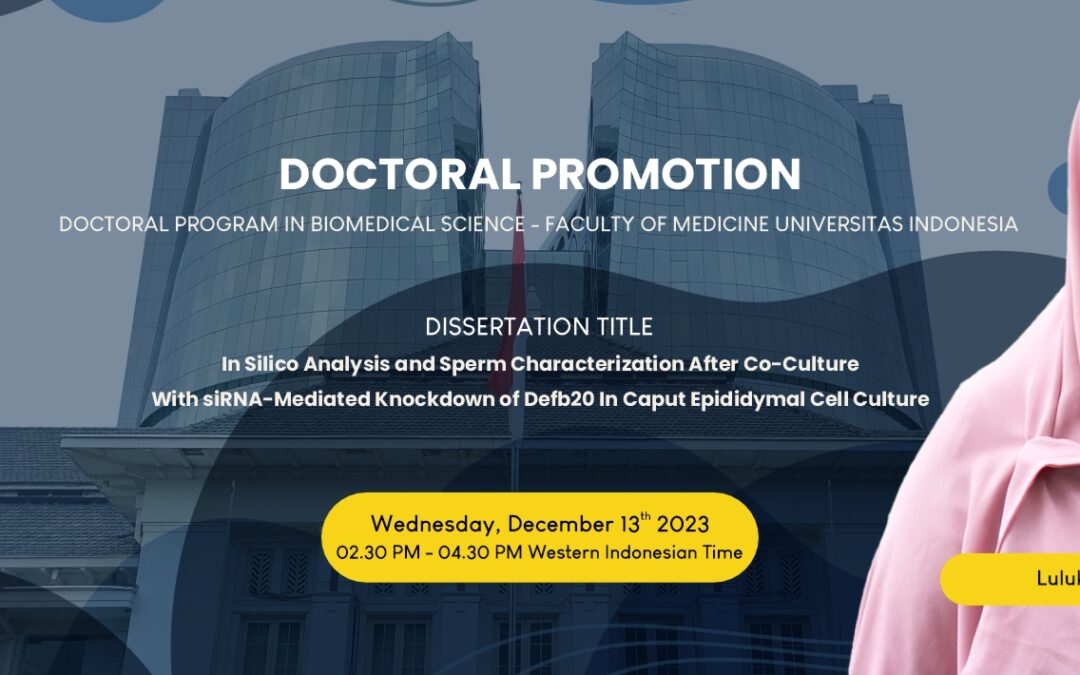Oleh : Dr. Luluk Yunaini, S.Si., M.Biomed
Pertumbuhan penduduk dunia pada umumnya dan Indonesia pada khususnya dari tahun ke tahun terns meningkat. Dampak dari peningkatan penduduk ini adalah penurunan kualitas hidup masyarakat. Untuk mengendalikan pertumbuhan penduduk maka perlu dilakukan peningkatan peran keluarga berencana melalui penggunaan kontrasepsi.
Sampai saat ini metode kontrasepsi didominasi untuk kaum perempuan dan kurang ada inovasi untuk meningkatkan peran pria. Pengembangan alat kontrasepsi pria non hormonal dengan cara men-target protein atau gen yang terlibat dalam proses pematangan spenna di epididimis sangat menjanjikan untuk dapat mengendalikan kesuburan pria. Salah satu kandidat gen epididymis yang dapat dijadikan sebagai alat kontrasepsi adalah D4b20. Hasil studi menunjukkan bahwa Defb20 memiliki karakteristik protein epididimis yang berperan dalam proses pematangan sperma,seperti terekspresi spesifik di epididimis pada masa pubertas, di regulasi oleh androgen dan merupakan protein sekretori. Hal ini menunjukan fungsi spesifik Defh20 di epididymis, namun data dari penelitian sebelumnya ini belum mengkonfinnasi fungsi gen dalam pematangan sperma. Penelitian yang dilakukan oleh Luluk Yunaini (mahasiswi Program Doktor Ilmu Biomedik FKUI dan staf pengajar di Departemen Biologi Kedokteran FKUI) di bawah bimbingan tim promotor yang di ketua oleh Dwi Ari Pujianto Ph.D. melakukan analisis fungsional Dejb20 dengan pendekatan studi in silico dan invitro. Pendekatan insilico yakni dengan melakukan prediksi bioinformatik interaksi Defb20 dengan protein lain , sedangkan pendektan invitro dilakukan melalui penekanan ekspresi gen Dejb20 dengan metode transfeksi siRNA Defb20 pada sel kultur epididymis mencit. Penekanan ekspresi gen defb20 bertujuan untuk menghentikan pembentukan protein DEFB20, sehingga terjadi penurunan kadar protein Defb20 pada sel kultur kaput epididymis mencit.
Hasil penelitian dengan pendekatan studi in silico menggambarkan adanya interaksi antara protein Detb20 dengan protein CatSper yang merupakan protein kanal ion. Protein defb20 mencit dapat berinteraksi dengan protein CatSper mencit maupun protein CatSper manusia. Hasil ini memprediksi Defb20 berperan dalam pematangan spenna melalui proses persinyalan kalsium. Detb20 diduga memblok daerah ion transfer pada protein CatSper sehingga mencegah terjadinya kapasitasi prematur dan atau reaksi akrosom spontan sehingga sperma dapat melakukan fusi dengan sel telur secara optimal.
Sel Sperma manusia yang di kultur bersama dengan sel epitel kaput epididimis mencit yang ditransfeksi siRNA Defb20 menunjukkan adanya peningkatan kadar kalsium total yang diikuti dengan penurunan motilitas secara bermakna. Selain itu terjadi tren penurunan fosforilasi tirosin, peningkatan reaksi akrosom dan aktivitas Caspase-3. Hasil ini menunjukkan bahwa tidak adanya protein Defb20 dapat menginduksi terjadinya kematian sel sperma.
Hasil penelitian ini memberikan pemahaman yang baik tentang interaksi DEFB20 dengan protein lain dan implikasinya terhadap fungsi sperma. Selain itu Informasi ini membuka wawasan mengenai potensi DEFB20 sebagai salah satu protein yang penting untuk mengatasi masalah kesuburan yang terkait dengan motilitas sel spenna dan kapasitasi. Di sisi lain, penghambatan protein Detb20 berpotensi untuk dikembangkan sebagai kontrasepsi pria non-hormonal.
Dr. Luluk Yunaini, S.Si., M.Biomed memperoleh gelar Doktor dengan predikat Summa Cum Laude dengan IPK sempurna 4.00. Selain itu Dr. Luluk merupakan lulusan pertama kelas riset (degree by research) di Program Doktor Ilmu Biomedik – Fakultas Kedokteran Universitas Indonesia.

